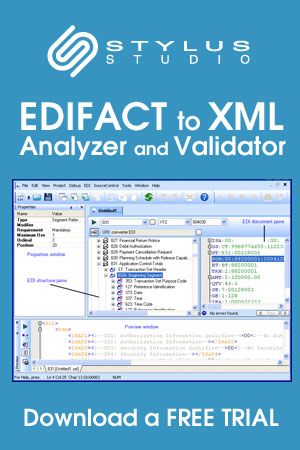

|
Return to Stylus Studio EDIFACT home page. Return to Stylus Studio EDIFACT D00A Messages page. Order status enquiry message
0. INTRODUCTIONThis specification provides the definition of the Order status enquiry message (OSTENQ) to be used in Electronic Data Interchange (EDI) between trading partners involved in administration, commerce and transport. 1. SCOPE1.1. Functional definitionA message between a buyer or buyer's agent and a seller or seller's agent for information on the current status of a previously sent order(s). 1.2. Field of applicationThe Order status enquiry message may be used for both national and international applications. It is based on universal practice related to administration, commerce and transport, and is not dependent on the type of business or industry. 1.3. PrinciplesThis message may relate to:
The order status enquiry can be sent as 'non-specific enquiries', i.e. asking for all outstanding orders, or as 'specific enquiries', i.e. asking for specific orders or order lines. 2. REFERENCESSee UNTDID, Part 4, Chapter 2.3 UN/ECE UNSM - General Introduction, Section 1. 3. TERMS AND DEFINITIONS3.1. Standard terms and definitionsSee UNTDID, Part 4, Chapter 2.3 UN/ECE UNSM - General Introduction, Section 2. 4. MESSAGE DEFINITION4.1. Segment clarificationThis section should be read in conjunction with the segment table which indicates mandatory, conditional and repeating requirements. The following guidelines and principles apply to the whole message and are intended to facilitate the understanding and implementation of the message:
4.1.1. Header sectionInformation to be provided in the Header section: 0010 UNH, Message headerA service segment starting and uniquely identifying a message. The message type code for the Order status enquiry message is OSTENQ. Note: Order status enquiry messages conforming to this document must contain the following data in segment UNH, composite S009:
0020 BGM, Beginning of messageA segment by which the sender must uniquely identify the order status enquiry by means of its type and number and when necessary it's function. 0030 DTM, Date/time/periodA segment specifying general dates and, when relevant, times related to the whole message. The segment must be specified at least once to identify the request date. The Date/Time/Period segment within other Segment group should be used whenever the date/time/period requires to be logically related to another specified data item e.g. Reference issue date is specified within the RFF Segment group. 0040 IRQ, Information requiredTo indicate which information is requested in the responding Order status report message. 0050 FTX, Free textA segment with free text information, in coded or clear form, used when additional information is needed but cannot be accommodated within other segments. In computer exchanges such text will normally require the receiver to process this segment manually. 0060 Segment Group 1: NAD-SG2A group of segments identifying the parties with associated information. 0070 NAD, Name and addressA segment identifying names and addresses of the parties, in coded or clear form, and their functions relevant to the proposed order. Identification of the sender (normally the buyer) is mandatory for the enquiry. It is recommended that where possible only the coded form of the party ID should be specified. 0080 Segment Group 2: CTA-COMA group of segments giving contact details of the specific person or department within the party identified in the NAD segment. 0090 CTA, Contact informationA segment to identify a person or department, and their function, to whom communications should be directed. 0100 COM, Communication contactA segment to identify a communications type and number for the contact specified in the CTA segment. 4.1.2. Detail sectionInformation to be provided in the Detail section: 0110 Segment group 3: DOC-DTM-SG4 A group of segments providing details of the individual requested order(s). 0120 DOC, Document/message detailsA segment giving references to the purchase order(s) enquired. Other references may also be given, e.g. sellers reference number. 0130 DTM, Date/time/periodA segment specifying the date/time related to the reference. 0140 Segment Group 4: LIN-PIA-IMD-MEA-STS-SG5-SG6A group of segments providing details of the individual requested order(s) lines. 0150 LIN, Line itemA segment used to identify a line item. 0160 PIA, Additional product idA segment providing additional identification on the product specified in the LIN segment. E.g. To give seller's item number, EAN number, technical specification number. 0170 IMD, Item descriptionA segment for describing the product as well as product characteristic. This segment should be used for products and services that cannot be fully identified by a product code or article number. 0180 MEA, MeasurementsA segment enabling the physical measurements of the ordered item to be specified where this is required for full identification of the product. Any measurements must refer to the product in its unpacked form e.g. thickness of plastic film, length, weight, etc. 0190 STS, StatusThis segment is used to specify the reason why an order status enquiry is being made for to the current product. 0200 Segment Group 5: RFF-DTMA group of segments giving references related to the order line(s) and, where relevant, its dates. 0210 RFF, ReferenceA segment giving references to sellers reference number, contract numbers, etc. 0220 DTM, Date/time/periodA segment specifying the date/time related to the reference. 0230 Segment Group 6: LOC-DTM-QTYA group of segments used to request the status of only certain delivery of an order line. 0240 LOC, Place/location identificationA segment indicating the location to which goods are to be delivered. This segment will only be used for multi destination deliveries. 0250 DTM, Date/time/periodA segment specifying the date/time related to the product quantities. 0260 QTY, QuantityA segment identifying the product quantities. 0270 UNT, Message trailerA service segment ending a message, giving the total number of segments in the message (including the UNH & UNT) and the control reference number of the message. 4.2. Segment index (alphabetical sequence)
4.3. Message structure4.3.1. Segment table
Return to Stylus Studio EDIFACT D00A Messages page. |

|
| Site Map | Privacy Policy | Terms of Use | Trademarks |